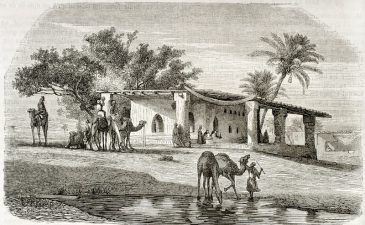 Empty land in Israel’s Arava desert. (photo by Jesse Fox)
Empty land in Israel’s Arava desert. (photo by Jesse Fox)
A conflict may be brewing between an emerging renewable energy industry and environmentalists over land preservation in Israel. The heart of the controversy has to do with where to put the massive solar installations that are expected to be built in the arid Negev and Arava regions in the south of the country.
To the untrained eye, Israel’s southern deserts are a vast expanse of empty land, largely uninhabited and ostensibly a perfect setting for solar energy initiatives, something which the country’s environmental movement has been pushing for quite some time. Now, however, when the country seems on the brink of setting up an extensive system of solar power plants both large and small, green organizations are expressing concern that covering large swaths of land with solar energy infrastructure could disrupt desert ecosystems.
“We aren’t saying we don’t need renewable energy – quite the opposite,” clarified Yael Cohen-Paran of the Israel Energy Forum last week at the Eilat-Eilot Renewable Energy Conference. Speaking in a panel discussion on “land as the main constraint to the growth of renewable energy in Israel,” Cohen-Paran calculated that meeting Israel’s renewable energy commitments with current photovoltaic technologies could result in hundreds of square kilometers of land being covered with solar panels and related infrastructure.
In a letter to the Prime Minister last week, the Israel Energy Forum criticized the government’s renewable energy policy for putting too much emphasis on photovoltaic technology, which it says is costlier, less productive and more land-intensive than other technologies currently available. The Forum suggested transferring resources away from encouraging PV, and into renewable energy R&D, high-output technologies such as solar thermal and especially energy efficiency.
Iris Hann of the Society for the Protection of Nature in Israel added that government regulation should protect open spaces by encouraging solar energy production on the country’s rooftops. “The more we allow open spaces to be exploited,” she said, “the less of an incentive there will be to develop roof space. Developing open space should be the option of last resort, and even then only on land adjacent to built-up areas.”
In the southern Arava, a number of kibbutzim are taking advantage of a new government policy that allows for the conversion of agricultural lands to renewable energy production of up to 5 megawatts. Ruti Frum of the Agriculture Ministry noted that “agricultural plots are a golden opportunity for renewable energy entrepreneurs, but we have to be careful we don’t sign all of them away.” She also noted that, as technologies improve over time, solar energy production will require less land.
Kobi Dinar, CEO of Sunday Energy, argued that a piece of land can be used for multiple purposes, estimating that 500 MW of solar power could be produced by overlaying solar energy installations on top of Israel’s water reservoirs.
Udi Gat, Chairman of the Hevel Eilot Regional Council in the southern Arava, admitted that there are disagreements about open spaces, with demands coming from farmers, environmentalists and energy companies (as well as the military, which he said controls 90% of the land in the Arava.) “We can certainly use agricultural lands to generate power, especially in the south of the country, where there is more sun and less water, but we have to aspire to leave as much untouched land as possible,” he said.
Gat also mentioned that the regional councils in the south are working on a strategic plan to locate open spaces that can be used for renewable energy generation without disrupting the desert ecosystem. One example of such an approach is the planned Timna Renewable Energy Park, which is slated to be built on degraded lands once used for copper mining.


